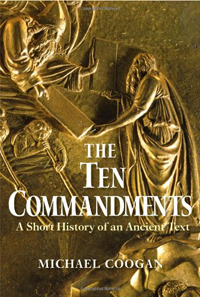Book Notes
 Michael Coogan, The Ten Commandments; A Short History of an Ancient Text (New Haven: Yale University Press, 2014), 176pp.
Michael Coogan, The Ten Commandments; A Short History of an Ancient Text (New Haven: Yale University Press, 2014), 176pp.
By rabbinic tradition there are 613 commandments in the Old Testament, but pride of place goes to the Ten Commandments. Why is that? There are three versions of the Ten Commandments, each slightly different than the other — Exodus 20, Deuteronomy 5, and Exodus 34. They are inscribed on the Supreme Court Building. They've been the subject of several Supreme Court cases, and an epic 1956 film by Cecil B. DeMille. Michael Coogan, director of public relations at Harvard's Semitic Museum, and lecturer in Old Testament at the Harvard Divinity School, explores in what sense this divinely written code, two thousand years old and written by the finger of God on tablets of stone, is rightly considered an authoritative text for today.
In their original historical context, the Ten Commandments were part of God's covenant contract with his chosen people Israel. After admittedly "piling conjecture on conjecture," Coogan reaches a fairly conservative conclusion. The Decalogue "is very ancient, older than its expansions in the redacted biblical sources," rather than from the fifth- or sixth-century BCE, "and the covenant that it formulates, and perhaps even the formulation as ten short commandments, is the essence of the teaching of Moses himself." In his longest chapter (43pp), Coogan suggests the meaning of each one of the ten commandments.
The first four commandments are limited to the people of Israel — the prohibitions against polytheism and images, the name of God, and the sabbath rest. The other commands are not too unusual and could apply to broader society — parents, murder, adultery, kidnapping, perjury, and property. And notice: slaves and women are taken for granted as property, which is a tip off that we need to be careful about applying the Decalogue to today. Neither Jews nor Christians consistently observed the prohibition against images, for example. The apostle Paul said that Christ was "the end of the law." It would be neither wise nor good to apply the Decalogue in a pluralistic society, says Coogan, even though they rightly enjoy a privileged status among Jews and Christians.


